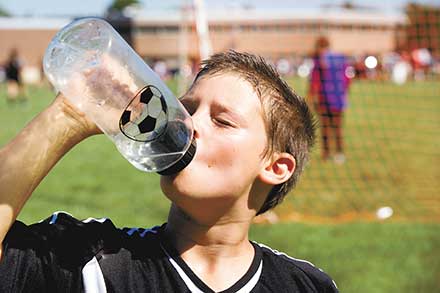Lawrenceville – Summer is a season begged to be spent outdoors. “But before you head out,” says Tim Simmons, MHA, ATC, LAT, director, Sports Medicine Program at GMC-Duluth, “remember that the South’s summer heat can be unforgiving. Preventing heat injury and illness should take priority whether you’re out for an afternoon at the beach or running a marathon.” These tips from the experts at GMC can help keep your summertime fun safe:
Avoid 10 to 4
Stay indoors during the peak hours of the sun. Its rays are the strongest between 10 a.m. and 4 p.m., so try to schedule outdoor activities before or after those times.
Slather on the Sunscreen
Liberally apply sunscreen about 20 to 30 minutes before going outside. Because the sun emits two types of harmful rays-UVA and UVB-your sunscreen should provide broad-spectrum protection against both, with a sun protection factor (SPF) of at least 15.
Reapply, Reapply, Reapply
Reapplying sunscreen may be the most neglected step in the sun-safety regimen. Sunscreen should be reapplied about every two hours while you’re outdoors, and every 45 minutes if you’re swimming.
Hat’s It!
Head out with a hat that protects your face, neck and ears. Choose one with a wide brim at least three to four inches around for suitable coverage. The bucket and wide-brimmed farmer’s hats, in a lightweight straw or cotton twill, are two classic, stylish choices.
Seek Shade
Seek shade, but do so with caution. While trees and umbrellas provide protection, you still need to protect yourself under them. The sun’s rays can scatter, penetrate and reflect to reach you.
Dress for the Occasion
Covering up in dark, tight-knit fabric is the best way to protect your skin, but it’s no fun in the summer heat. Fortunately, some companies now make lightweight clothing with effective sun protection. These items bear an ultraviolet protection factor or UPF (think of it as an SPF for fabric) of 15 to 50 on their labels.
Play Movie Star
Forget paparazzi cameras; you’ve got a better reason to shield your eyes. The eye area is incredibly vulnerable. Prolonged sun exposure can damage your eyes and increase your risk of developing eye disease. Wear sunglasses that block 99 to 100 percent of UVA and UVB radiation.
Stay Hydrated
Start out hydrated each day, especially when you’re planning to be outdoors. While sports drinks can be helpful, be sure water is your main beverage.
Add It All Up
“Though each of these tips is important,” says Simmons, “following one or two isn’t enough.“ Doing just one thing won’t adequately protect you against the heat and sun exposure you get in the summer months. Drink water, wear the hat, the clothing, the sunglasses and the sunscreen. They’re all essential…for everyone.
When summer activity revs up, so do the sports injuries. Learn the symptoms and treatments for a variety of common sports-related injuries.
Download your own copy of the Sports Injury Toolkit from Gwinnett Medical Center’s Sports Medicine Program at gwinnettsportsmed.com/toolkit.


